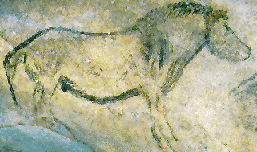| What is called the "Upper Paleolithic" culture is believed
to have begun about 40 000 years ago. The first cultural style in
Europe was called the Aurignacian culture. The stone tools of this
culture were more diverse and sophisticated than those of the Mousterian
culture.
Upper Paleolithic Europeans are believed to have been highly skilled nomadic hunters. These humans would have followed their favourite game, the reindeer, in its seasonal migrations. They are believed to have used the altlatl, or spear-thrower, which would have greatly enhanced their prowess. Like Neandertals, these humans lived in caves and rock-shelters. Upper Paleolithic tools are highly crafted. A wide variety of these tools served very specific purposes, such as engraving bone and ivory for ornamentation. |

This is a cave mural taken from the caves in Lascaux, France. |
| It was during this time that culture began to embrace
art, self-adornment and probably mythical or religious beliefs. This
is evident from beginning around 35 000 years ago. It was 11 000
years ago that Agriculture began. This revolution allowed the population
to increase enormously and ultimately allowed humans to transform the Earth.
It would be interesting to link these important cultural advances to genetic
changes which would allow for greater reasoning abilities, a heightened
imagination and awareness. No change in brain size has been associated
with it.
|